Get out more!
The Digest
Fieldwork is an essential part of the learning experience for the geo, geosocial and life sciences that needs protecting given current squeezes on finances. We saw how mobile learning is enabling a blurring of the boundaries between field, lab, library etc. People are more interested in QR codes than I expected. We got wet.
The Detail
We had 2 days based at the Margam Discovery Centre, near Port Talbot where a wide range of people presented what they had been doing in relation to technology enhanced fieldwork. It was an entirely appropriate venue with fantastic facilities and a feel that you were in the field even when you were in the building. It was run by a project team funded by the Higher Education Academy.
I was there mainly out of my interest in digital mapping and geolocative stuff and also because I’m a geography graduate so it feels like home turf. I was also presenting a short presentation on how QR codes can be used to enhance fieldwork by creating easy access to extra layers of information.
I Audioboo’d my reactions to the main activities here…
…and made a short video of some of the stuff we did here…
Enhancing Fieldwork Learning from Chris Thomson on Vimeo.
Incidentally, both Audioboo and the Vimeo app are great ways of easily creating digital media content in the field. The video was filmed and edited on my iPhone without any need for connectivity.
This was the session I delivered (without the running around in the fresh air bit).
For the practical activity I placed 10 laminated sheets with 2 QR codes each on around the site. One QR code linked to a Google Map of a significant UK location where the participants had to guess the connection. The other QR code was a one of the Top Tips from slides 11 and 12. I figured it was more fun to make them hunt for the advice than just spoon feed it to them!
I was a bit worried I’d picked a topic that people would already be familiar with but in the end it was new ground for a good number of attendees and a few people were fomenting their own fieldwork plans involving QR codes by the end of the weekend.
Main learning points from the weekend:
- Everyone there was a passionate advocate for fieldwork as an effective learning experience and there was plenty of discussion about the uncertainty facing departments with squeezed budgets. How assured is the future of fieldwork in institutions?
- There was a determination that technology should be there to enhance the field experience and make it accessible to all students. It shouldn’t be there to replace it.
- Fieldwork should be fully embedded in curriculum planning with a clear sense of progression of skills development from one year to the next, gradually building students up into independent field researchers.
- Technology allows us to do the current things better (thinking about the collaborative spreadsheets mentioned in the Audioboo) as well as creating new opportunities.
- Access to devices is complicated and relying on students to use their own isn’t the easy answer. What if they object to effectively subsidising someone else’s fieldwork because they have a device and the other doesn’t? Poorer students who can’t afford a device are at a disadvantage.
- Best tech experiences
- Seeing ipads used in conjunction with Twitter and Flipboard for students to co-create field guides for New Zealand prior to visiting. Carina Fearnley (Aberystwyth).
- Using iPads to layer GIS, satellite and maps imagery while in the field, then using GPS to help students contextualise that information with their current location. Apparently it’s difficult for many students to do this. Peter Bunting (Aberystwyth)
- Wifi. In a field! Trevor Collins and John Lea demonstrated their portable wifi network that can extend over kilometres thanks to a series of relays
- Gigapan, which you can see demonstrated by Ian Stimpson (Keele) in the last few clips of the video, takes multiple images of a location, zoomed in and in hi resolution that can be stitched together to create interactive panoramas with gigapixel levels of detail. Here’s an example. Great for pre-field trip familiarisation, giving students with mobility issues a chance to see inaccessible locations or simply having an “if wet” option.
- Students in Singapore conducting surveys of a mangrove swamp, entering their data onto a shared spreadsheet on a tablet over wifi, enabling the group to analyse their data and discuss it all within the context of the site (Julian Cremona, Field Studies Council)
Reflections
Thinking back to the fieldwork I undertook as a student, they were transformative experiences not just because of what I learnt but also because they were important milestones on the way to becoming a geographer; it helped dismantle the boundaries between staff and students. It was an essential part of my student experience and I think it would be a shame if fieldwork was squeezed out for some courses.
Also, fieldwork is a multi sensory experience. I’m keen to discover more about using things like AR, QR codes, and mobile digital media but if it means less being part of the landscape and more staring into an LCD screen we’ll have lost something.
Lastly, I’m sorely tempted to investigate whether I could make the Netskills geolocation workshop a residential event and run it at a field centre like Margam Park. It would certainly be more challenging but a much more fulfilling experience to mix computer lab activity with field work [ponders].
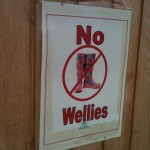
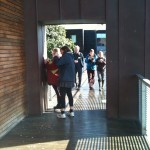
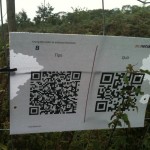
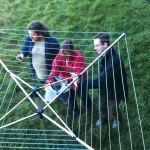
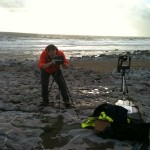
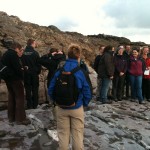
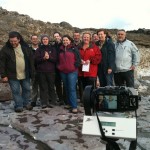
One reply on “Event report: Enhancing Fieldwork Learning”
Thanks George. Shame you couldn’t make it. Hope the GNR went well. 🙂